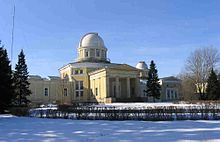Society and culture in Saint Petersburg

Saint Petersburg has always been known for its high-quality cultural life, and its best known museum is the Hermitage.
Music in Saint Petersburg
Among the city's more than fifty theaters is the world-famous
, were principal stars of the Mariinsky ballet.
Dmitri Shostakovich was born and brought up in St. Petersburg, and dedicated his Seventh Symphony to the city, calling it the "Leningrad Symphony." He wrote the symphony while in Leningrad during the Nazi siege. The 7th symphony was premiered in 1942; its performance in the besieged Leningrad at the Bolshoy Philharmonic Hall under the baton of conductor Karl Eliasberg was heard over the radio and lifted the spirits of the survivors;[1] each musician received 125 grams of bread after the premiere. In 1992 a reunion performance of the 7th Symphony by the (then) 14 survivors was played in the same hall as they done half a century ago.[2] The Saint Petersburg Philharmonic Orchestra remained one of the best known symphony orchestras in the world under the leadership of conductors Yevgeny Mravinsky and Yuri Temirkanov.
Choral music has a great tradition here. The Imperial Choral Capella was founded and modeled after the royal courts of other European capitals.
St. Petersburg has been home to the newest movements in popular music. The first
In the 1970s, many bands came out from "underground" and eventually founded the
Today, St. Petersburg boasts many notable musicians of various genres, from popular Leningrad's
The White Nights Festival in St. Petersburg is famous for spectacular fireworks and massive show celebrating the end of school year: "Scarlet Sails" celebration in St. Petersburg
Museums and art spaces in Saint Petersburg
Saint Petersburg in the movies
Over 250 international and Russian movies were filmed in St. Peterburg.
The first foreign feature movie filmed entirely in St. Petersburg was the 1997 production of Tolstoy's and other famous landmarks and streets of St. Petersburg.
Soviet-made films, such as the trilogy of "Maksim" by director
St. Petersburg is a set for
St. Petersburg in literature

St. Petersburg has a longstanding and world famous tradition in literature.
20th-century writers from St. Petersburg, such as Vladimir Nabokov, Andrey Bely, Yevgeny Zamyatin with his apprentices Serapion Brothers created entire new styles in literature and contributed new insights in the understanding of society through their experience in this city. Anna Akhmatova became important leader for Russian poetry. Her poem Requiem, focuses on the tragedies of living during the time of the Stalinist terror. Another notable 20th-century writer from St. Petersburg is Joseph Brodsky, recipient of the Nobel Prize in Literature (1987). While living in the United States, his writings in English reflected on life in St. Petersburg from the unique perspective of being both an insider and an outsider to the city in essays such as "A Guide to a Renamed City" and the nostalgic, "In a Room and a Half".[5]
Sport

St. Petersburg hosted part of the
The first competition here was the 1703 rowing event initiated by Peter the Great, after the victory over the Swedish fleet. Yachting events were held by the Russian Navy since the foundation of the city. Equestrianism has been a long tradition, popular among the Tsars and aristocracy, as well as part of the military training. Several historic sports arenas were built for Equestrianism since the 18th century, to maintain training all year round, such as the Zimny Stadion and Konnogvardeisky Manezh among others.
, and which the Tsar had partially funded.Notable people

Many important Russian and international figures, politicians, businessmen, artists, writers and scientists were born and/or have lived in Saint Petersburg. These include many of
.Education and science



Saint Petersburg has long been a leading center of science and education in Russia.
- Russian Academy of Sciences (1724)
- Saint Petersburg State University (founded 1724)
- Saint Petersburg Naval Academy (founded 18th century)
- Imperial Academy of Arts (founded 1757)
- Vaganova Academy of Russian Ballet
- Saint Petersburg Medical-Surgical Academy (founded 1798)
- Saint Petersburg Mining Institute(Горный институт) (founded 1773)
- Saint Petersburg State Institute of Technology (1828)
- Pulkovo Observatory (1839)
- Ivan Pavlov's Medical Academy and research center. (founded 1880s)
- Saint Petersburg Conservatory (1862)
- Alexander Military Law Academy (founded 1867)
- Saint Petersburg State Electrotechnical University(1886)
- Saint Petersburg Polytechnical University(1899)
- State Marine Technical University (Корабелка) (1899)
- Saint Petersburg State University of Information Technologies, Mechanics and Optics(1900)
- Saint Petersburg State University of Engineering and Economics (1906)
- St. Petersburg State Medical Academy(1907)
- Saint Petersburg State Technical University of Telecommunications
- Saint Petersburg Pharmaceutical Academy
- Saint Petersburg Academy of Pediatrics and Maternity (founded 1900)
- Saint Petersburg Theatre Academy (former Tenishev's College) (1899)
- Saint Petersburg Academy of Film and Television
- Russian State University of Pedagogy(Herzen University) (1797)
- St. Petersburg State University of Culture and Arts (1918)
- Saint Petersburg State University of Economics and Finance (Финэк) (1930)
- Baltic State Technical University ("ВОЕНМЕХ") (1932)
- St. Petersburg Aerospace University (Mozhaysky University)
- Smolny College (1999)
See also
References
- ^ "Where a symphony silenced guns". The Guardian. 2005-10-16. Archived from the original on 2023-05-24.
- ^ Orchestral manoeuvres (part one)
- ^ EMI Classics - The Male Choir of St. Petersburg CD Booklet - Vadim Afanasiev
- ^ Internet Movie Database
- ^ Joseph Brodsky. Less Than One: Selected Essays, 1986
